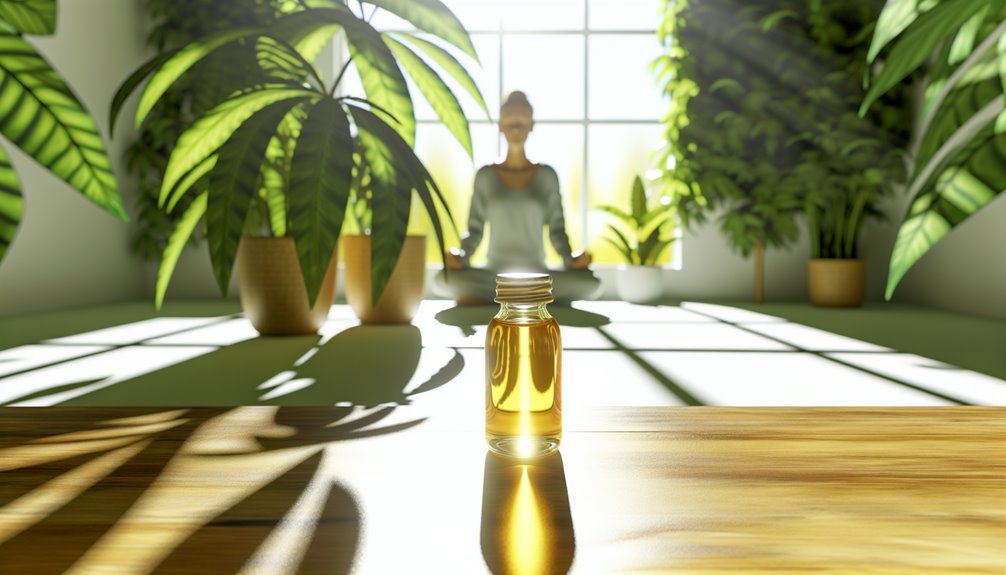Imagine standing at the crossroads of traditional and alternative medicine, a place where ancient botanical wisdom meets modern scientific understanding. You're exploring the potential of medical cannabis, specifically high-CBD strains, in managing anxiety and depression. The evidence is mounting, with studies suggesting CBD's anxiolytic properties can offer relief across a range of anxiety levels. Even the weight of depression may lighten, sleep may improve, and life's quality can enhance with sustained use. But the path is not without its pitfalls—understanding the right dosage and potential risks is essential. So, what's the next step?
Understanding Anxiety and Depression: A Brief Overview

While anxiety and depression are common, understanding their prevalence is essential. Over 19% of U.S. adults experience anxiety each year, with a higher prevalence among women and younger adults. Depression affects 21.4% of adults, again, with higher rates among women. The causes of anxiety and depression vary—socioeconomic factors, age, and gender all play roles. It's imperative to comprehend the various types depression and anxiety can take as well. Treatment options range from medication to therapy, offering stress relief and symptom management. Effective coping strategies and emotional support are central to mental health maintenance. Education on these conditions, their prevalence, and treatment is a powerful tool for those dedicated to serving others. Additionally, it's worth noting that depression is a physical condition resulting from a chemical imbalance in the brain.
The Science of Medical Cannabis: Cannabinoids and Their Effects
Delving into the science of medical cannabis, it's vital to understand the role of cannabinoids, specifically THC and CBD, and their impacts on mental health. THC, the primary psychoactive compound in cannabis, can decrease anxiety at lower doses but increase it at higher ones. On the other hand, CBD appears to reduce anxiety at all tested doses. However, it's important to take into account dosage and cannabinoid interactions, as high levels of THC can exacerbate mental health conditions. Cannabis use can also lead to dependency, characterized by cravings, increased tolerance, and withdrawal symptoms. Therefore, while medical cannabis might offer short-term relief, long-term use may worsen mental health outcomes, emphasizing the need for careful usage and further research. Moreover, it's crucial to remember that hemp, a low-THC version of cannabis, is legally defined as containing 0.3% THC or less, making it a less potent but safer alternative.
Medical Cannabis and Anxiety: What Does the Research Say?

Building on the understanding of cannabinoids and their effects, let's explore what the current research says about medical cannabis and anxiety. Studies show promising evidence of cannabis efficacy in anxiety reduction.
- CBD, a key compound in cannabis, displays anxiolytic properties, considerably reducing anxiety symptoms in both acute and chronic treatments.
- CBD-dominant products are associated with greater anxiety reduction and less tension than THC-dominant ones.
- Longitudinal studies reveal that sustained medical cannabis use can improve anxiety symptoms over time.
- Medical cannabis is generally safe with infrequent adverse effects, especially when using CBD-dominant products.
How Depression Responds to Medical Cannabis: Scientific Evidence
Diving into the domain of scientific evidence, let's explore how depression responds to medical cannabis. Studies involving patient demographics aged 20-54 show promising clinical outcomes. At Sapphire Medical Clinics, medicinal cannabis was associated with significant reductions in depression severity at 1, 3, and six months. Concurrent improvements in sleep quality and life quality were observed. Roughly half of the patients showed a significant treatment response after 18 weeks. Side effects were mild, and the cannabis was well-tolerated. However, it's important to highlight that existing research doesn't definitively prove a cause-effect relationship, emphasizing the need for further studies. Fundamentally, medical cannabis seems to offer hope for depression treatment, but more rigorous research is required to optimize its use.
The Role of CBD in Treating Anxiety and Depression

Shifting our focus from depression to anxiety, we now turn our attention to the potential role of Cannabidiol (CBD) in treating both conditions. Here's the lowdown based on the evidence:
- Studies suggest CBD can effectively reduce anxiety symptoms, particularly in treatment-resistant disorders. Yet, more high-quality evidence is needed to cement these findings.
- CBD's action mechanism involves complex interactions with the brain's neurotransmitter systems, including CB1 and serotonin receptors.
- Generally, CBD is well-tolerated with minimal adverse effects. However, it's essential to consult with a healthcare professional before starting.
- Although promising, more large-scale clinical trials are needed to confirm the effective dosages and long-term safety of CBD.
Always adhere to CBD dosage guidelines and pay heed to CBD user experiences to optimize your use safely and effectively.
Personal Stories: Anecdotal Evidence of Cannabis for Mental Health
Although research on the use of medical cannabis for anxiety and depression is still building, anecdotal evidence suggests promising results. Personal experiences reveal that cannabis benefits extend to symptom relief, providing a tolerable alternative to traditional medications. Users report reduced anxiety and depression, increased productivity, and relief from panic attacks. For some, medical cannabis has replaced ineffective or aggravating medications, managing multiple symptoms with a single treatment. The impact on daily life is profound: improved sleep, enhanced well-being, and better emotional regulation. Despite initial hesitations and the need for self-research, these personal stories highlight the potential of cannabis for mental health. However, they also underscore the importance of guidance from cannabis-friendly doctors and continued policy advocacy.
Risks and Side Effects: Understanding Potential Drawbacks of Medical Cannabis

While personal narratives paint a hopeful image of cannabis for mental health, it's equally important to contemplate the potential drawbacks. Medical cannabis carries both short-term and long-term risks.
- Addiction Risks: Regular usage can lead to cannabis use disorder, particularly among teens. It's a significant concern that requires careful monitoring.
- Mental Health Risks: Instead of alleviating depression, regular cannabis use could exacerbate it. There's also an increased risk of anxiety and suicidal thoughts in some individuals.
- Physical Health Risks: High and frequent use increases the risk of heart disease, heart attack, and stroke. Lung problems due to smoking or vaping cannabis are also a concern.
- Long Term Effects: These include negative impacts on attention, learning, and memory, especially in teens and young adults.
These potential drawbacks necessitate a balanced and cautious approach to using cannabis for mental health.
Legal Aspects of Medical Cannabis Use for Mental Health
Despite the potential risks, medical cannabis is gaining legal acceptance across many states. The legal variations are stark: currently, 30 states and the District of Columbia have medical cannabis laws in place. These laws allow patients with qualifying conditions, which often include mental health disorders like anxiety, to access cannabis. Access mechanisms differ by state, some requiring a specific medical cannabis card. Notably, the implementation of these laws has been associated with reduced dispensing of benzodiazepines, a class of anti-anxiety drugs. However, the impacts of these laws on mental health prescriptions are complex, necessitating continual adjustment and evaluation. In serving patients effectively, it's essential to understand these legal aspects of medical cannabis for mental health.
Future Perspectives: Ongoing Research and Developments in Cannabis Treatment

As we look to the future, it's evident that ongoing research and developments in cannabis treatment hold significant potential. Here's a brief look at the future implications of some key ongoing trials:
- Cannabis and Anxiety: Trials aim to unravel the role of cannabis in anxiety treatment, given the current inconclusive clinical evidence.
- CBD as an Adjunct to Therapy: A randomized control trial is evaluating the efficacy of CBD in Prolonged Exposure therapy for PTSD in military Veterans.
- Cannabis-induced Pain Relief: Research focuses on understanding the neural mechanisms behind this phenomenon.
- Impact on the Endocannabinoid System: Studies are exploring how cannabis use affects this system and its potential interactions with other biological systems.
These ongoing developments promise to further our understanding and enhance our ability to serve better.
Conclusion
While you might be skeptical about using medical cannabis for anxiety or depression, consider the mounting scientific evidence. CBD, especially, has shown promise in reducing symptoms. However, it's crucial to be aware of potential side effects and legal implications. With continued research, we hope to establish definitive guidelines to effectively harness the therapeutic potential of medical cannabis in mental health treatment. Remember, it's not a cure-all, but it could be another tool in your wellness toolkit.
If you're curious to learn more about how medical cannabis might help with anxiety or depression, I warmly invite you to visit Fells Point Cannabis Docs of Maryland or give them a call at (410) 401-4200. Their friendly team is ready to answer your questions and guide you through the process. Taking that first step towards understanding your options can be incredibly empowering, and who knows? It could lead to a positive change in your wellness journey!
